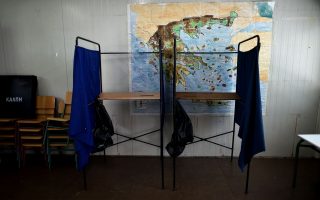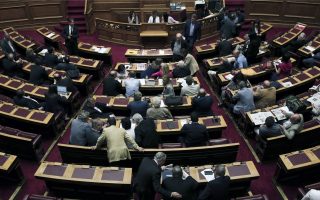Near-East effects on far-right success
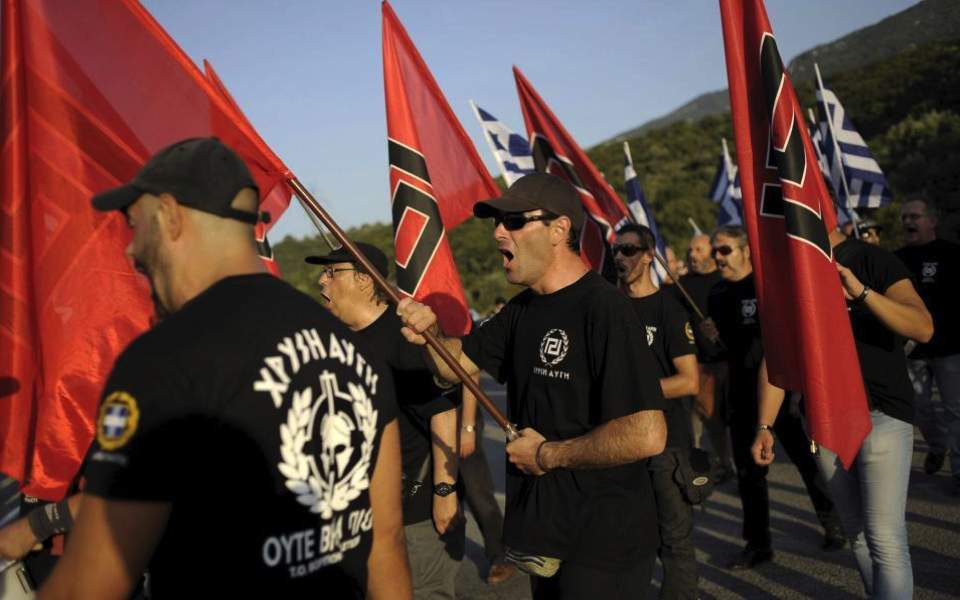
Perhaps one of the most notable outcomes of the September 20 parliamentary elections in Greece – second only to the record-low turnout and the clear victory of the governing SYRIZA party despite all pollsters predicting a tight race – is the remarkable resilience of the far-right Golden Dawn party, which managed to score some gains despite officially being charged as a criminal organization.
The party first made its appearance in mainstream Greek politics during the double elections of 2012 (May and June) securing more than 6 percent of the vote. In the elections for the European Parliament in May 2014 the party gained an impressive 9 percent of the vote share, which placed it third – above the once dominant center-left social-democratic PASOK. Even though elections for the European Parliament traditionally carry an element of protest vote, there is no doubt about the success of Golden Dawn in entrenching itself in the Greek party-system and consolidating its position. The elections of January and September 2015 are testament to this fact: In January 2015, Golden Dawn maintained its electoral support at the 6 percent level and again earned third place. And in September 2015 it scored some additional gains – reaching 7 percent – comfortably securing the third spot once more.
While many reasons might be behind the electoral rise and consolidation of the Greek anti-immigration far-right party, the press has been quick to link this effect with the increased refugee flows to Greek islands during the summer months and the insufficient response from the Greek government. As evidence of this claim they mentioned the increased electoral support for Golden Dawn on some islands that received the bulk of those refugee flows (e.g. Kos, Samos and Lesvos).
At a first glance, the argument seems to be valid. Yet one needs to interpret such crude comparisons with caution as they might fail to take into account certain pre-existing trends. For example, the fact that Golden Dawn increased its electoral support on Kos and Lesvos by almost 5 percent and 4 percent respectively might also be attributed to some other confounding or idiosyncratic factors. Perhaps the increased electoral support for Golden Dawn is a result of other parameters that simultaneously drive electoral support for the far-right party and the response of local communities to the refugee crisis. Moreover, Golden Dawn has seen its electoral support rise in regions that are not directly affected by the refugee flow, such as Zakynthos and Pella. Hence, one cannot light-heartedly attribute this sizeable rise in Golden Dawn’s electoral support on these islands to increased refugee flows alone – at least not without further investigation.
In order to further investigate this claim and assess its validity, we have collected data concerning the electoral support for Golden Dawn in all municipalities (islands) in the electoral districts of Lesvos, Chios, Samos and the Dodecanese. In Figure 1, we plot the change in electoral support for Golden Dawn between the January and the September 2015 elections as a function of the proximity of each island to the Turkish coast. We find a clear, negative, and statistically significant relationship. That is, support for Golden Dawn has increased at a higher rate on islands that are closer to the Turkish coast. The underlying assumption is that, irrespective of the idiosyncratic political characteristics of each island (e.g. Lesvos and Ikaria have traditionally leaned toward leftist parties such as the Greek Communist Party), their distance from the Turkish coastline is fixed and unaffected by such political factors. At the same time, it is reasonable to expect that human traffickers would prefer to choose the shortest possible route, in order to transport refugees from the Turkish coast into Greek territory. As a result, the closer an island is to the Turkish coast, the more likely it is to have experienced a higher influx of refugees and, hence, higher support for Golden Dawn.
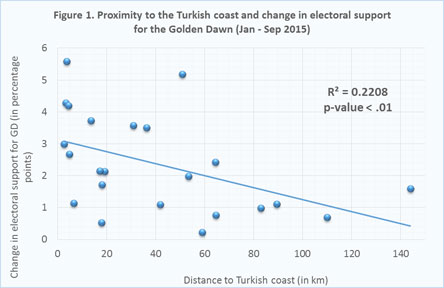
Ideally, one would like to compare the differential change in the electoral support for Golden Dawn against the counterfactual of the same island experiencing no refugee flows during the same time, in order to control for the electoral effect of the changing political environment between the January and September elections. While it is practically impossible to conduct such an exercise, in Figures 2.a, 2.b, and 2.c we present the evolution of Golden Dawn’s vote share over time between two islands that belong to the same prefecture and are quite similar in many dimensions other than the amount of refugees they received during the past couple of months.1
As one may observe, prior to the September elections electoral support for Golden Dawn had a very similar pattern in all sets of islands and the trend is almost identical, which implies that irrespective of any differences the evolution of electoral support for Golden Dawn has been very similar between Lesvos and Lemnos, or Ikaria and Samos, or Karpathos and Kos. To put it differently, while, for example, support for Golden Dawn was always higher on Lemnos and Samos compared to Lesvos and Ikaria respectively (due to the strong presence of the Greek Communist Party on the latter islands), the trend of electoral support had followed the same pattern during the past three electoral contests until September 2015. That is, we do not have evidence of diverging patterns of electoral support on those islands before the September 2015 elections. It is only in September 2015 that we pick up this differential increase in the vote share of Golden Dawn on those islands. This provides further evidence that the surge in electoral support for Golden Dawn during the last election appears to be an outcome of the increased refugee flows toward those islands.
The above observation still leaves the exact causal mechanism a bit mute. We offer two such possible causal explanations. One is that the inability of central and local government to deal effectively with the refugee crisis infuriated voters, who chose to punish the “establishment” parties and support the “anti-systemic” Golden Dawn as a form of protest. Another plausible explanation might be that increased refugee flows, which strained the already limited resources of those islands, caused negative – and even hostile sometimes – feelings and attitudes toward refugees and immigrants by the local population, which in turn translated into increased electoral support for an openly anti-immigration party such as Golden Dawn. But, irrespective of the exact causal explanation, there is little doubt over the fact that the documented increased in electoral support for Golden Dawn on those islands seems to be associated with the increased refugee flows during the summer months before the election.
While it is hard to predict if this change in the electoral behavior will persist in the future – once refugees are transported to mainland Greece — the way that Greek authorities have been dealing with the refugee crisis over the last couple of months is telling of the incompetence of mainstream political parties and the party system as whole. Instead of putting out the fire of the extreme right, they have managed to fuel it further.
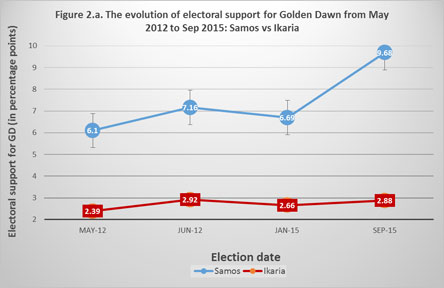
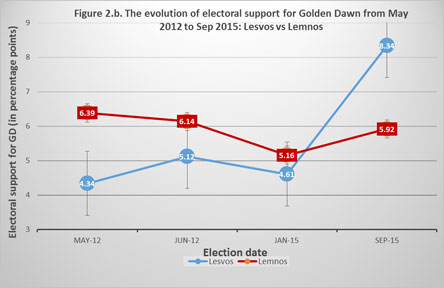
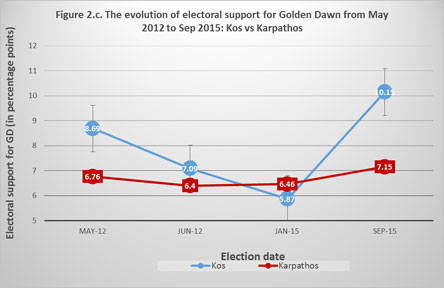
1. Note that the blue line denotes the island that has received more refugees.
Konstantinos Matakos is Assistant Professor of Economics in the Department of Political Economy at King’s College, London.
Dimitrios Xefteris is Assistant Professor of Economics in the Department of Economics at the University of Cyprus.
